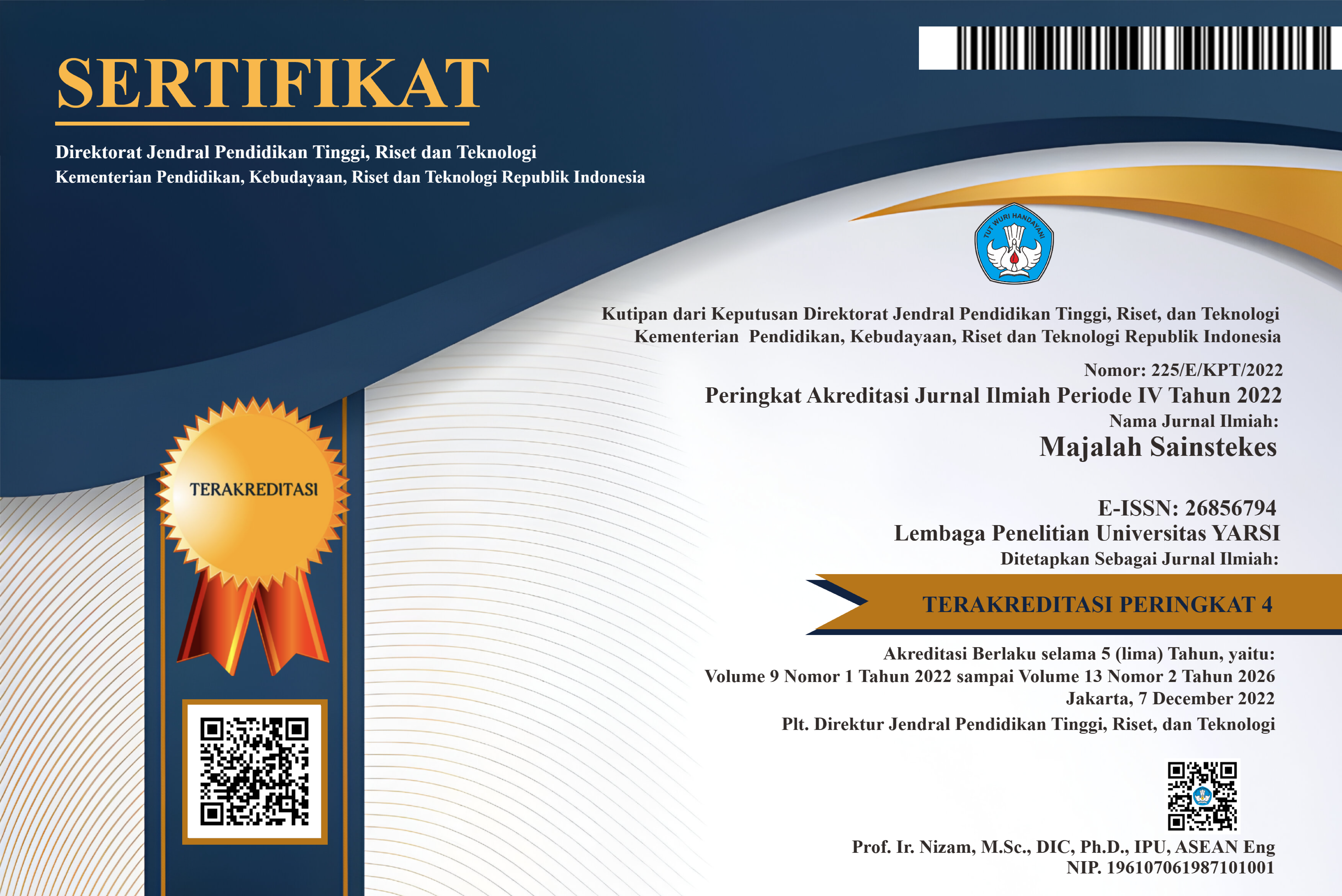Knowledge and Attitudes of Students of Faculty of Medicine, YARSI University Towards Hepatitis B Vaccine from the Medical Perspective and Islamic Point of View
Keywords:
Knowledge, Attitude, Hepatitis B VaccineAbstract
Background: Hepatitis B is a major cause of morbidity and death, and is still a health problem for many people in the world. Indonesia is one of the countries that has a medium hepatitis B surface antigen (HBsAg) prevalence, which is between 3.0% -18.5%. The main content of a vaccine is a virus or bacteria. In addition to active ingredients, there are adjuvants in the vaccine ingredients. The combination of the main active ingredients (antigens) and adjuvants is more effective than using an antigen vaccine only. In Islam, the vaccination includes preventive treatment measures (wiqayah), therefore the vaccines are subject to legal treatment, with various opinions from halal (permissible) to forbidden. This study aimed to find out the knowledge and attitudes of students of faculty of medicine, YARSI University towards Hepatitis B vaccines viewed from the medical and Islamic perspective. Method: The study used cross sectional research design. The participants of this study were active students of Faculty of Medicine, YARSI University year 2015 by using questionnaire. The total number of students of class 2015 was 250 people. The number of students who met the inclusion criteria was 224 students. Error margin was 5% with a minimum sample estimate of 144 people. Result: As many as 24% of the students was aware that hepatitis B vaccine contains aluminum, formaldehyde. Meanwhile, 72% of the knew that aluminum side effects causes CNS damage. The percentage of students who knew that rejecting the vaccination can be penalized was 27%. While 69% of the students knew that the provision of vaccine does not require informed consent. About 79% of the students understood that technique treatment from prophet era as an alternative to increase immunity in children. Regarding the attitudes towards vaccine programs promoted by the government, 31.2% of the students disagreed. While 33.1% of the students agreed with the provision of vaccines. The majority of the students (70.8%) agreed with obtaining informed consent before the vaccination. Moreover, 58% of the students Were doubtful about education before giving the vaccine. While 58% of the students disagreed that the technique method can be an alternative to substitute vaccines. Conclusion: Although there was a lack of students’ knowldge about aluminum content, Thimerosal and formaldehyde in vaccines, the students know that long term use of Hepatitis B Vaccine which contain Aluminum, Thimerosal and Formaldehyde can cause damage to the central nervous system. Regarding the students’ attitude towards Hepatitis B immunization, the students agree with the immunization program promoted by the government but they agree that informed consent should be taken and do not know about the sanction if they block or reject the immunization program by the government.References
Ahmad, Sarwat. 2016. Benarkah Hukum Imunisasi Mutlak Haram? [on-line]. Rumah Fiqih Indonesia. Cited 2019, June 24. Available from: http:
//www.rumahfiqih.com/x.php?id=1369554754
Is aluminum in vaccines safe, or toxic? Why is aluminum in vaccines? [on-line]. Aluminum in Vaccines: History and Toxicity. 2017. Cited 2019, June 23. from: https://thinklovehealthy.com/2017/06/22/aluminum-in-vaccines-history-and-toxicity/
Kurikulum. Faculty of Medicine [on-line]. cited 2019, June 24. from: http://fk.YARSI.ac.id/en/kurikulum/
Miller, N. Z,. “Aluminum in Childhood Vaccines Is Unsafe”, Journal of American Physicians and Surgeons, 21(4). 109–16.
Offit. P. A. 2019. Vaccine Ingredients-Aluminum. Children's Hospital of
Philadelphia 2018 [on-line]. Cited, June 24. from: https://www.
chop.edu/centers-programs/vaccineeducation-center/vaccineingredients/aluminium
Palevsky. L. B. 2019 Aluminum and Vaccine Ingredients: What Do We Know? What Don’t We Know? [on-line]. National Vaccine Information Center Your Health. Your Family. Your Choice. Cited, June 23. from: https://www.nvic.org/Doctors-Corne
r/Lawrence-Palevsky/Aluminum-and Vaccine-Ingredients.aspx
PERATURAN MENTERIKESEHATAN REPUBLIK INDONESIA NOMOR 12 TAHUN 2017 TENTANG PENYELENGGARAAN IMUNISASI. Hukor Kemenkes [on-
line]. cited 2019, June 24. from: http://hukor.kemkes.go.id/uploads/
produk_hukum/PMK_No._12_ttg_Penyelenggaraan_Imunisasi_.pdf
Poole, R. L., et.al. “Aluminum Exposure in Neonatal Patients Using the Least Contaminated Parenteral Nutrition Solution Products”, Nutrients, 4. 1566–74.
Rencana Strategis Kementrian Kesehatan Tahun 2015-2019. Kementrian Kesehatan Republik Indonesia [on-line]. cited 2019, June 24. From: http://www.depkes.go.id/resources/download/info-publik/Renstra 2015.pdf
Rigolet, M., et.al. 2019. Clinical features in patients with long-lasting
macrophagicmyofasciitis [on-line]. cited, June 24. from:
https://www.frontiersin.org/article/10 3389/fneur.2014.00230
Sharon, Thomas., BREAKING RESEARCH: Hepatitis B vaccine can lead to brain-damaging effects [on-line]. Natural Health 365. 2018. Cited 2019, June 24. From: https://www.naturalhealth365.com/hepatitis-bvaccine-dangers-2774.html
UNDANG-UNDANG NOMOR 4 TAHUN 1984 TENTANG WABAH
PENYEKIT MENULAR. Tatanusa [on-line]. Cited 2019, June 24. from:
http://www.tatanusa.co.id/nonkuhp/1984UU04.pdf
UNDANG-UNDANG REPUBLIK INDONESIA NOMOR 36 TAHUN 2014 TENTANG TENAGA KESEHATAN. Hukum Online [on-line]. Cited 2019, June 24. From:
https://www.hukumonline.com/pusatdata/download/lt5450b9100d285/node/lt5450b859e4e6b
Vicki, Batts. 2019. Disturbing study reveals connection between brain damage and hepatitis B vaccine [on-line]. Newstarget. Cited 2019 June 24. From: https://www.newstarget.com/2019-02-17-disturbing-study-reveals-connection-between-brain-damage-and-hepatitis-b-vaccine.html
Wang, X., et al. “IL-4 mediates the delayed neurobehavioral impairments induced by neonatal hepatitis B vaccination that involves the down regulation of the IL4 receptor in the hippocampus”, Elsevier, 110. 137–49.

 Asep Zainuddin Sahir
Asep Zainuddin Sahir












